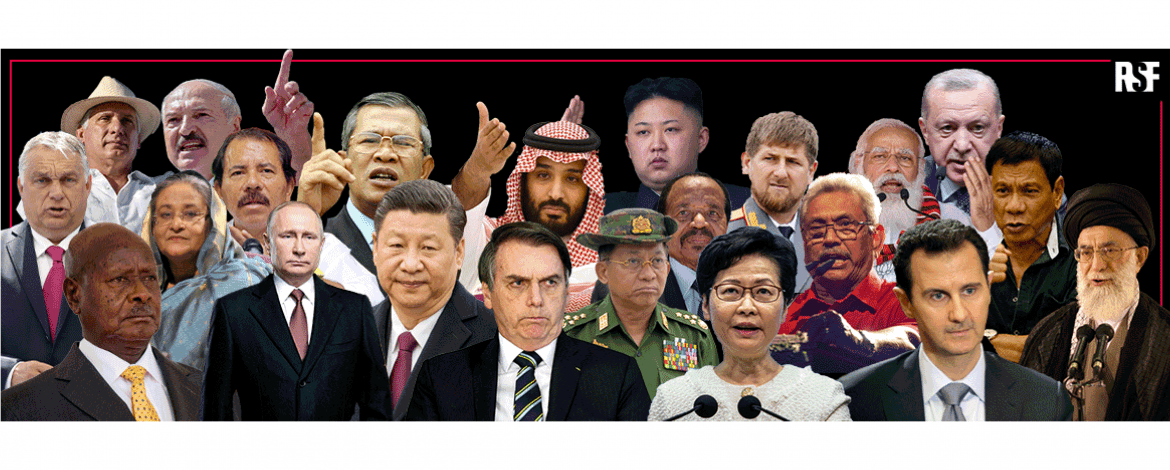By Rommel F. Lopez

Some of the world leaders named in the Reporters without Borders (RSF) list of World Press Freedom Predators. President Rodrigo Duterte is on the far right. (image from Reporters without Borders)
President Rodrigo Duterte was among 37 world leaders “who crack down massively on press freedom” included in the 2021 “press freedom predators” list of media watchdog Reporters Without Borders (RSF).
The Paris-based media watchdog published on Monday a list of world leaders noted for “trampling on press freedom by creating a censorship apparatus, jailing journalists arbitrarily or inciting violence against them.”
A “predator since taking office”, the RSF said Duterte imposes his predatory method in the Philippines by waging “total war” against independent media.
The report noted how Duterte warned journalists are not exempted from assassination, just because of his/her profession and “if you’re a son of a bitch”.
The RSF said Duterte wields “enormous power” to force judges who don’t toe the line to be pushed aside while Congress “tamely endorses” his decisions.
The report also highlighted how Duterte easily imposes his whims on media outlets owned by businessmen that support him and that independent media outlets have assumed the role of opposition “with all the risks that this entails.”
“Thanks to collusion at all levels within the state apparatus, Duterte has an arsenal that he can use to wage “total war” against journalists, an arsenal that includes spurious charges of defamation, tax evasion or violation of capital legislation; rescinding broadcast licences; getting accomplices to buy up media outlets and bring their journalists into line; and using an army of trolls to subject journalists to online harassment,” it noted.
The media watchdog said a handful of media outlets have tried to cover Duterte’s authoritarian excesses but ended up becoming the president’s “favorite targets”.
Among Duterte’s “favorites” are the Philippine Daily Inquirer, ABS-CBN and Rappler.
The Inquirer was bought up a year after Duterte warned his media critics that “their karma will catch up with them.” The RSF noted how the Inquirer’s journalists “were brought to heel.”
In December 2019 during an oath-taking of newly appointed government officials in Malacañang, Duterte promised that ABS-CBN would not have a new franchise in 2020.
“Ang inyong franchise mag-end next year. If you are expecting na ma-renew ‘yan, I’m sorry. You’re out. I will see to it that you’re out,” Duterte said.
After several promises from leaders of the House of Representatives and the National Telecommunications Commission (NTC) that the broadcasting giant can be granted a provisional authority even if its franchise expires and while its franchise renewal is being heard in Congress, the NTC, on May 5, 2020, ordered ABS-CBN to stop its broadcast operations.
Two days before that, on World Press Freedom Day, Solicitor General Jose Calida warned NTC officials that they may face graft charges if they grant a provisional permit to ABS-CBN to broadcast beyond its May 4 franchise expiry.
During the House deliberations on the franchise renewal of ABS-CBN, charges against the network ranging from foreign ownership, unpaid loans, taxation violations, frequency rules violations were brought up which were all debunked or cleared by concerned government agencies invited to the House panel hearings.
In July 2020, Duterte’s allies in the House of Representatives eventually sealed the fate of ABS-CBN by denying the renewal of its broadcasting franchise.
Rappler and its CEO, Maria Ressa, are facing numerous lawsuits and prosecution. The president accused Rappler of violating the Constitution with foreign ownership. In March 2019, the Court of Appeals (CA) denied Rappler’s motion for partial reconsideration and upheld its earlier findings that the company’s foreign investment amounted to the Constitutional prohibition of foreign control of a media company in the country. The RSF noted that Ressa is possibly facing sentences totaling around 100 years in prison.
RSF secretary-general Christophe Deloire noted that each of the 37 press freedom predators of the world has their own style, some imposing a reign of terror by issuing irrational and paranoid orders.
“Others adopt a carefully constructed strategy based on draconian laws. A major challenge now is for these predators to pay the highest possible price for their oppressive behaviour. We must not let their methods become the new normal,” Deloire said.
Other world leaders on the list include Hong Kong’s Carrie Lam, one of two women leaders on the list. The RSF called a “puppet of Chinese President Xi Jinping, and now openly supports his predatory policies towards the media.” Under Lam Hong Kong’s leading independent newspaper, Apple Daily, was closed on 24 June and its founder, Jimmy Lai, a 2020 RSF Press Freedom laureate, was jailed.
New entrants include Brazilian President Jair Bolsonaro, “whose aggressive and crude rhetoric about the media has reached new heights since the start of the pandemic”, and Hungary’s Viktor Orbán, the self-proclaimed champion of “illiberal democracy” who has steadily and effectively undermined media pluralism and independence since being returned to power in 2010.
In April, the Philippines slipped to 138th place out of 180 countries in the 2021 World Press Freedom Index. The media watchdog noted the “extremely draconian laws or decrees” that supposedly make government criticism a crime and the resurgence of “red-tagging” against individuals and groups critical of the government.
However, Presidential spokesperson Harry Roque downplayed the country’s downgrading in the rankings adding that the Palace calling it “de minimis” or insignificant.